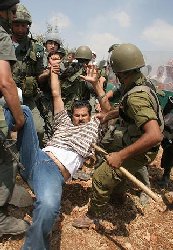By Majida Abu Rahmah
On International Human Rights Day in 2008, my husband Abdallah Abu Rahmah was in Berlin receiving a medal from the World Association for Human Rights. Last year on the same day, 10 December, Abdallah was taken away at 2am by Israeli soldiers who broke into our West Bank home. Abdallah was arrested for the same reasons he received the prize -- his nonviolent struggle for justice, equality and peace in Palestine/Israel.
My husband is a school teacher and farmer from the Palestinian village of Bilin. When Israel built its apartheid wall here, it separated Bilin from more than half of its land, in order to facilitate the expansion of the illegal settlement Mattityahu East. In response, Abdallah and fellow villagers began a campaign of nonviolent resistance. Every Friday for the past five years, we've marched, with Israeli and international supporters, to protest the theft of our land and livelihoods.
In September, 2007, Israel's Supreme Court ruled that the route of the wall in Bilin was illegal and should be changed. Over two years later, the wall remains, unmoved. Many were discouraged, but Abdallah told them that the pressure of our campaign and international support could bring down the wall.
As the grassroots struggle grows here, the efforts to end our actions have intensified. The army has been instructed to use weapons against the protesters and arrest participants. Our beloved friend, Bassem Abu Rahmah, was murdered by Israeli soldiers as he tried to talk with them, while participating in a demonstration. Seventy-seven others have been arrested in violent night raids.
Among the other arrestees is Abdallah's cousin Adeeb Abu Rahmah, who, like Abdallah, never missed a demonstration and was never violent. Adeeb, a father of nine, has been in prison for five months, with no end in sight. Since the first time our home was invaded, our seven-year-old daughter Luma has been waking up screaming, and five-year-old Layan wetting her bed. Only our nine-month-old son Laith still smiles and giggles, but I cry when he calls for his father.
Leaders like former President Jimmy Carter and Archbishop Desmond Tutu, one of the leaders of South Africa's anti-apartheid struggle, have visited our village. They stood with Abdallah at Bassem's grave last August. Tutu told us, "Just as a simple man named Gandhi led the successful nonviolent struggle in India and simple people such as Rosa Parks and Martin Luther King led the struggle for civil rights in the United States, simple people here in Bilin are leading a nonviolent struggle that will bring them their freedom."
The afternoon before his arrest, Abdallah prepared a speech to be read on his behalf to the World Association for Human Rights since Israel would not allow him to travel to Germany for the ceremony. Abdallah wrote:
"I wish I could be with you to share in the joy of our colleagues receiving this year's prize and to celebrate with you the 20th anniversary of the removal of the Berlin Wall. But the occupation not only robs us of statehood, land, and so often of our lives, it also deprives us of many beautiful moments."
"My mother passed away in a hospital in occupied East Jerusalem, our historic capital, in August but the Israeli occupation refused me a permit to be with her. An Israeli friend held a mobile phone to my mother's ear so that I could say goodbye to her and thank her for all the love she has given me. In the darkness of all these difficulties the occupation imposes on us, the solidarity of justice-seeking people like you all over the world gives us strength."
"Unlike Israel, we have no nuclear weapons, and no army, but we do not want or need those things. With your support and the justice of our cause, we will bring down Israel's apartheid wall."
PHOTO CAPTION
Archive photo taken on the 17/5/2005 in the village of Bilin, Abdallah Abu Rahmah is seen during a demo against the apartheid wall, while Israeli soldiers try to arrest him.
Source: Commondreams.org


 Home
Home Discover Islam
Discover Islam Quran Recitations
Quran Recitations Lectures
Lectures
 Fatwa
Fatwa Articles
Articles Fiqh
Fiqh E-Books
E-Books Boys & Girls
Boys & Girls  Ramadan
Ramadan Fatwa Audios
Fatwa Audios Month of Mercy
Month of Mercy Women
Women Eed Al- Fitr
Eed Al- Fitr Food Recipes
Food Recipes Videos
Videos

 Prayer Times
Prayer Times












